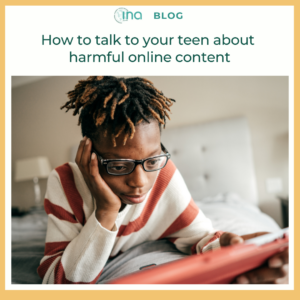
By Penelope Greyson
In today’s world where technology has become an integral part of our everyday lives, it’s crucial for parents and caregivers to have open and honest conversations with their teenagers about the dangers that can arise online. The internet is a diverse and unpredictable space, and while it may be beneficial for their learning and communication, it also has a dark side.
It’s our responsibility to protect our children from the dangers that the internet can present as much as possible, equipping them with the necessary tools to navigate the online world safely. In this article, we explore some key things to consider when starting this conversation with your teen.
Explain the potential consequences
The first step to protecting your teen from harmful online content is to explain the potential consequences of exposure to such material. Help them to understand that their online actions don’t just have online consequences, and can actually translate into long-lasting effects on their reputation, relationships and future careers.
It’s also important to educate your teenager about the legal ramifications of certain online activities, such as sharing inappropriate content or participating in cyberbullying. They need to understand that these actions are against the law, so something that may seem insignificant online can quickly turn into life-changing conduct.
Set clear boundaries
While it’s valuable to trust your teenager to use their own judgment to a certain extent, it’s important that they have some basic rules on their internet usage. They should have a clear idea of what is and isn’t allowed, alongside any predefined limits on their screen time.
If you think this might be a problem for your teen, you could also consider implementing parental controls on their devices. This could mean forcing the screen to lock after a specified period of time, blocking access to certain websites or restricting entire applications. However, it’s important to find a balance between monitoring their activity and respecting their privacy. By openly communicating with them about your expectations, you can work towards an arrangement that you’re both comfortable with.
Create a judgment-free environment
In order for your teen to trust you enough to open up about their online activity, it’s important to establish a judgment-free environment. Encourage open discussions, and make sure to listen to them when they’re expressing their thoughts without interrupting.
Your teen should be comfortable coming to you with any questions they might have about online content, so it’s vital that you aren’t overly critical or dismissive. Instead, try to have open and respectful conversations without lecturing.
Opening an ongoing dialogue
Although discussing harmful online content may feel uncomfortable, it’s an essential part of parenting in today’s digital age. Starting this conversation is an important first step, but it won’t be a one-time thing. You should work to establish an ongoing conversation around internet safety, addressing new risks as they come about. This way, you can foster a relationship based on trust and have a better chance of protecting your teen from the potential dangers of harmful content.
Author bio
Penelope Greyson is a professional nanny, with decades of experience in parenting both her own children and multiple clients. She has firsthand experience with the dangers that the internet poses and works to educate parents and caregivers about the importance of open communication. In her free time, you can find her in the local park bird-watching with her binoculars.
